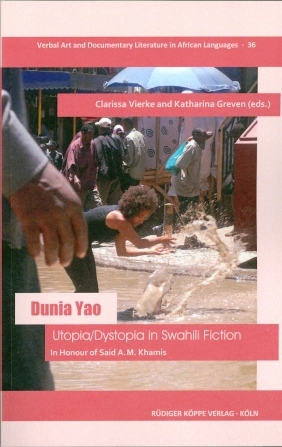
Dunia Yao – Utopia/Dystopia in Swahili Fiction
In Honour of Said A.M. Khamis
Edited by: Clarissa Vierke, Katharina Greven. With an introduction by: Clarissa Vierke, Katharina Greven. With contributions by: Abdilatif Abdalla, Elena Bertoncini-Zúbková †, Lutz Diegner, Mikhail D. Gromov, Geoffrey Kitula King’ei, Alena Rettová, Peter Simatei, Magdaline Nakhumicha Wafula, Ken Walibora Waliaula. Series edited by: Wilhelm J.G. Möhlig †.
Series: WK Verbal Art and Documentary Literature in African Languages Volume 36
2016232 pp.
2 col. photos, 1 colour chart
Text language(s): English, Swahili
Format: 160 x 240 mm
520 g
Paperback
€ 49.80
Buy 'Dunia Yao – Utopia/Dystopia in Swahili Fiction' as a downloadable PDF document directly from our online shop »
Order 'Dunia Yao – Utopia/Dystopia in Swahili Fiction' as print edition »
While Afrofuturism has been an important point of discussion in African arts and literatures more generally speaking, literatures in African languages have hardly been systematically considered for their imaginaries of the future. Focussing on Swahili literature, this publication brings together contributions which analyse a literary trend in East Africa that has been prominent since the 1990s.
A number of so-called experimental novels have painted dark pictures of societies’ future by also breaking with a number of previously established conventions of the novel. Often taking a comparative perspective, the contributions present facets of a fascinating literary history, which hinges on the following questions: How do/did Swahili authors construct their means of literary writing? How do the innovative style and the estranged fictional world of the writings relate to the recurrently underlined social commitment of the novel?
CONTENTS
Clarissa Vierke / Katharina Greven: Dunia Yao – Critical Visions of the Future in Swahili Fiction
A ‘New’ Trend – Perspectives of Literary History
Lutz Diegner: Dunia Yake – An Appraisal of Said Ahmed Mohamed’s Novels
Mikhail D. Gromov: ‘Local Achievement’ or ‘External Influence’? Intertextuality and Political Satire in the ‘New’ Swahili Novel in Kenya
Clarissa Vierke: The ‘Unhomely City’ – A Literary Figuration in Swahili Dystopian Literature
Readings of the Novel Beyond Realism
Elena Bertoncini: Postmodernism in Swahili Fiction and Drama
Alena Rettová: From Mimesis to Mize – Philosophical Implications of Departure from Literary Realism
Peter Simatei: Magical Realism and Utopian/Dystopian Impulses in Said Ahmed Mohamed’s Babu Alipofufuka
Utopia as Socially Committed Narrative
Abdilatif Abdalla: Fasihi ya Kiswahili na Mabadiliko ya Jamii za Afrika ya Mashariki – Nukta Chache
Geoffrey Kitula King’ei: Taswira za Ukosoaji na ‘Utopia’ katika Ushairi wa Said Ahmed Mohamed
Magdaline N. Wafula: Generational Conflicts in Dunia Yao – Utopia versus Dystopia
Ken Walibora Waliaula: Unravelling the Riddle of ‘Their World’ and ‘Our World’ in Said A. Mohamed’s Dunia Yao
Notes on Contributors
Under these links you will find further (Swahili) text editions and analyses of oral and written literature:
Accompanying material:
- Framing Texts – Framing Social Spaces
(ISBN 978-3-89645-742-4 ) - Kala Shairi
(ISBN 978-3-89645-171-2 ) - Life and Poems of Bi Zainab Himid (1920–2002) / Maisha na Tungo za Bi Zainab Himid (1920–2002)
(ISBN 978-3-89645-286-3 ) - Life is a Thriller
(ISBN 978-3-89645-830-8 ) - Liyongo Songs
(ISBN 978-3-89645-172-9 ) - Muhamadi Kijuma
(ISBN 978-3-89645-174-3 ) - Rewriting Yusuf
(ISBN 978-3-89645-177-4 ) - Swahili Proverbs from the Democratic Republic of the Congo
(ISBN 978-3-89645-744-8 ) - The Voice of the Text and its Body
(ISBN 978-3-89645-739-4 ) - Unser Leben vor der Revolution und danach – Maisha yetu kabla ya mapinduzi na baadaye
(ISBN 978-3-89645-274-0 ) - Vamps and Victims
(ISBN 978-3-927620-74-2 ) - White Elephant
(ISBN 978-3-89645-837-7 )
Cross-reference:
- African Languages in Global Society / Les langues africaines à l’heure de la mondialisation / Lugha za Kiafrika kwenye enzi ya utandawazi
(ISBN 978-3-89645-259-7 ) - African Media Cultures – Cultures de médias en Afrique
(ISBN 978-3-89645-246-7 ) - Afrikanische Frauen und kulturelle Globalisierung / African Women and Cultural Globalization / Femmes africaines et globalisation culturelle
(ISBN 978-3-89645-318-1 ) - Beyond the Language Issue
(ISBN 978-3-89645-819-3 ) - Bongo Media Worlds
(ISBN 978-3-89645-834-6 ) - From the Tana River to Lake Chad – Research in African Oratures and Literatures
(ISBN 978-3-89645-836-0 ) - Legenden, Märchen und Fabeln aus Ruanda
(ISBN 978-3-89645-743-1 ) - Speech Acts and Speech Events in African Languages
(ISBN 978-3-89645-893-3 ) - Tales, Fables and Narratives of Rwanda
(ISBN 978-3-89645-745-5 ) - The Travels of Sindbad the Sailor – Text in Tashelhiyt Berber (South Morocco) with a Translation in English
(ISBN 978-3-89645-959-6 )
Reviews
Recent years have seen a renewed scholarly interest in utopian and/or dystopian literary writing more generally. [...] The volume co-edited by Clarissa Vierke and Katharina Greven addresses a trend in Swahili literature and, most specifically, Swahili novels since the 1990s, which are often referred to as “new” or “experimental novels” and many of which resonate with aspects of utopian and/or dystopian writing. Dunia Yao, the 2006 novel by Said Ahmed Mohamed evoked in the volume’s title, represents, as the editors say, an “important example of the trend”, being set in a constructed, distant future world and offering “views on nightmarsh sceneries of devastation and chaos”. [...]
All in all, the volume represents an important and valuable contribution to a growing body of book-length critical studies of topics in Swahili literary discourse. By focusing on more recent developments in Swahili literary history, it provides a fascinating perspective on aspects of, as well as critical discourse on, the aesthetics and sociocritical concerns of contemporary Swahili literature. This makes it relevant not only to scholars of Swahili literature but of African literatures more generally.
[...] the volume fills a major gap, drawing attention to the perhaps obvious, but sometimes underestimated fact that African-language literatures partake of and creatively interact with global discourses and paradigms in multiple ways. In this respect, it enhances future comparative research.
Anja Oed in Africa Book Link, Winter 2016/2017, 1-3
| « back | Print version | [top] |
 Books
Books Audio
Audio Biographies
Biographies Series
Series Festschrifts
Festschrifts Journals
Journals